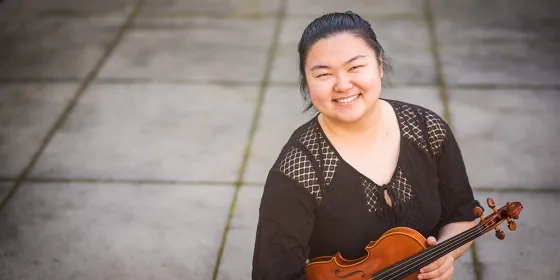Chuxuejie Zhang '19
“When I was young, music was not so special to me,” says Chuxuejie Zhang. “But when I grew up, it became a really important part of my life. It’s basically my whole life now.”
Zhang, a bachelor’s degree candidate and violin major studying with Ian Swensen, started her instrument at the age of four. Even at a young age, it seemed she was destined for life as a musician. Her teacher, a family friend, commented that she had good hands for playing the violin. Upon hearing that offhand remark, her parents encouraged her to learn the instrument.
“I was too young to know what was special about this instrument,” reflects Zhang. “But I noticed it’s not like any woodwind instrument or any brass instrument—the sound of it is so smooth and it’s really melodic. It has this unique texture.” Her curiosity and keen insight were apparent from the get-go.
Zhang’s life hasn’t been the same since those first days toying with the instrument. Just a few years after beginning the violin, she moved from her home in Hunan Province to Beijing and entered the Central Conservatory of Music, widely regarded as China’s top music school. After receiving her high school diploma, there was no question she would seek out collegiate studies in music.
Like many international students, American higher education held a certain appeal for Zhang. With her eye on a number of top-quality music schools, she embarked on an audition tour, ultimately accepting an offer from SFCM to enroll as an undergraduate. Since arriving in the fall of 2015, she has embraced the educational approach of SFCM, a stark contrast to what she was used to in China.
Zhang is a sponge for knowledge in both music and non-music classes. Her favorite course so far has been “Introduction to Western Civilizations” taught by Nikolaus Hohmann, and she can’t help but draw parallels to music in the subject matter.
“I think what’s really good about this class is that it’s basically human history. It has this human element to it, so I think if we can have a better understanding of humans—of people themselves—we’re going to better understand music, too. It’s always this conversation between people: us, performers, and the audience.”
Zhang has an interest in theory, history, and repertoire to match. Her eyes light up when talking about the exotic scales in 20th-century works she has learned about in Scott Foglesong’s music theory class. Her hearing a recent performance of Shostakovich’s First Symphony by the San Francisco Symphony has stayed with her for months. She has taken it upon herself to explore the music of Prokofieff, Stravinsky, and John Adams after becoming immersed in their works.
Always looking for more, Zhang takes opportunities to create a dialogue between herself and music with which she is unfamiliar. She performed at last year’s Hot Air Music Festival, an event dedicated to highlighting today’s artists. In China, much of her musical training was centered on the masterworks of composers from the 18th and 19th centuries. Contemporary performance has opened new doors for her.
After she completes her studies in America—perhaps after a master’s degree—Zhang sees herself moving back to China. She is determined to bring back “the learning attitude” to her homeland. “Students here [at SFCM], no matter where they come from, are trying to be more talkative in class. Teachers encourage them to talk and voice their opinion.”
She sums it up matter-of-factly. “Your opinion is important.”
